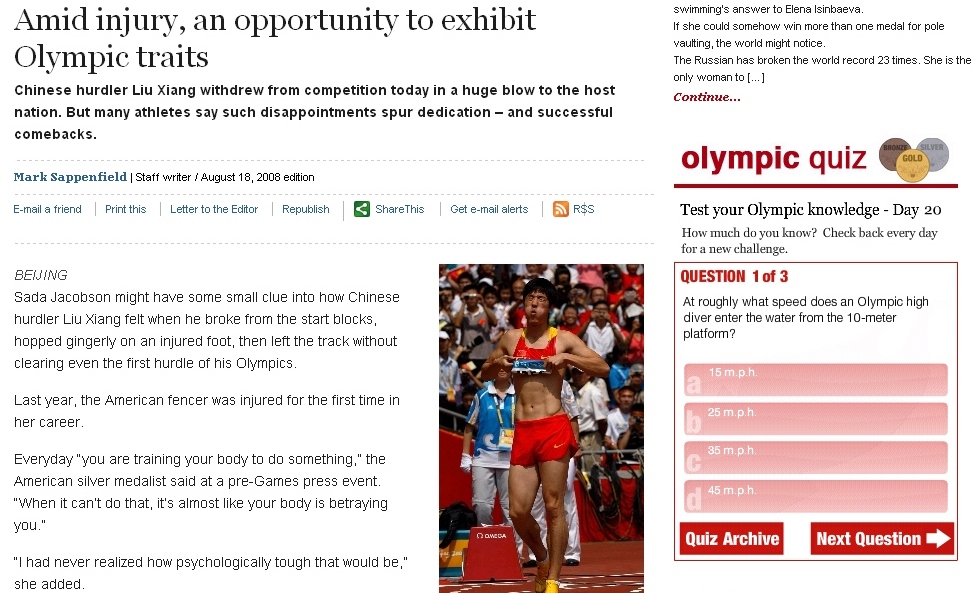|
|
【08.8.18 基督教科学箴言报】伤病中迸发奥林匹克品格
【原文标题】Amid injury, an opportunity to exhibit Olympic traits
【中文标题】伤病中迸发奥林匹克品格
【登载媒体】基督教科学箴言报
【来源地址】http://features.csmonitor.com/ol ... bit-olympic-traits/
【译者】荡漾
【声明】本翻译仅供Anti-CNN使用,谢绝转载
【原文】
Sada Jacobson might have some small clue into how Chinese hurdler Liu Xiang felt when he broke from the start blocks, hopped gingerly on an injured foot, then left the track without clearing even the first hurdle of his Olympics.
Last year, the American fencer was injured for the first time in her career.
Everyday “you are training your body to do something,” the American silver medalist said at a pre-Games press event. “When it can’t do that, it’s almost like your body is betraying you.”
“I had never realized how psychologically tough that would be,” she added.
Injuries and poor form have nagged Liu all year, yet the shock of his withdrawal from the men’s 110 meter hurdles today flowed from the Bird’s Nest in an audible silence. This was to be Liu’s Olympics as much as China’s. He was the face of Games here, seemingly on every billboard and ice-cream wrapper.
Beyond China’s disappointment, however, is a parable of the modern elite athlete. In an era of supplements and pioneering surgeries, athletes have come to see their bodies as finely tuned Porsches that require constant pampering and painstaking maintenance to push the limits of human performance.
Yet one athlete who recovered from a major injury to make these Games suggests that amid bodily breakdown lies an opportunity to exhibit the most Olympic of traits – dedication and an unyielding hope.
“You have to see it as a blessing in disguise,” says Ben Wildman-Tobriner, an American swimmer who overcame a serious chest injury to win gold in the 4 x 100 freestyle and finish fifth in a deep 50 meter freestyle field.
The possibility of Liu coming back to full fitness might seem small solace for some in China. China’s marvelous performance at these Games will help soothe the disappointment of his withdrawal. But he – like basketball player Yao Ming – was an image of an athlete who showed China could beat the best the world had to offer even the most competitive events.
In Athens, he won gold in the 110-meter hurdles, and until earlier this season, he owned the world-record time in the event. Yet this season he never neared his best, dropping out of several events with injuries and losing his world record to Cuban Dayron Robles, now the gold-medal favorite here.
The expectation placed upon Liu appeared to weigh heavy. Liu’s coach, Sun Haiping, says Liu is actually carrying two long-term injuries, one to his heel and one to his thigh. The heel injury is the one that prevented him from racing today, Sun said at a press conference.
Wildman-Tobriner has known similar frustration. In March 2007, he was the world champion in the 50-meter freestyle. Nine months later, he tore a chest muscle, putting his hopes for Beijing in doubt.
“The night after it happened, I was sitting on the couch and thought, ‘This stinks,’ ” he said at a pre-Olympic media summit in Chicago.
But the first step toward overcoming his injury was overcoming his sense of pity. “I felt sorry for myself for about 10 minutes, and since then it’s been full steam ahead.”
In the end, he made the Beijing team, and he now thinks he’s a more complete swimmer. “Having that injury allowed me to work on my kick,” he said.
Such were the expectations for Liu in Beijing, however, that the head of the Chinese track-and-field team went to great lengths to dispel any sense that Liu had failed the country.
“For the past four years, Liu Xiang has been an athlete with great stability who never drops out of competition easily,” said Feng Shouyang. “Obviously, when he went into the stadium, he went in with the greatest and the strongest will.”
In the hours immediately after the injury, there was some criticism of Liu’s effort on Chinese websites. He was stoic when he turned and walked from the track. By contrast, other Chinese athletes have openly wept merely for winning silver, not gold.
Hopefully, Feng finished: “I think the Chinese people will understand the situation and will encourage him to come back to the track.”
【译文】
中国跨栏运动员刘翔离开起跑器,小心翼翼地踮着受伤的脚,连奥运的第一个栏都没跨就离开了跑道,这种心情或许Sada Jacobson能理解。
去年,美国击剑手在她的职业生涯中第一次受伤,这位银牌获得者在奥运前一次新闻发布会上说:“你不断对身体加强训练,但当它不奏效,你会觉得被自己的身体背叛了。”
她补充说:“我以前从未意识到在心理上那是多么的困难。”
今年来,伤病和不佳的状态一直困扰着刘翔,然而他今天退出110米栏比赛还是令整个鸟巢陷入沉寂。这不仅是刘翔的奥运会,也是全中国的奥运会。刘翔就是奥运会的象征,每个广告牌甚至冰淇淋的包装纸上都能看到他。
然而在中国的失望之外刘翔无疑是充满寓言色彩的现代优秀运动员。在如今这样一个辅助与拓展性手术发达的时代,运动员们很清楚他们的身体就像调校精确的保时捷车一样需要长期与细致的维护以帮助他们将竞技状态推至极限。
不过有一位克服了大伤病重新回归奥运会的运动员表示在身体崩溃中存在着机会展示最具奥林匹克的品质——奉献和绝不放弃希望的精神。
Ben Wildman-Tobriner,美国游泳选手,克服了严重的胸部伤病赢得了本届奥运会4×100米自由泳接力金牌、男子50米自由泳的第五名。他说:“你得换个角度把伤病看作是一种祝福。”
刘翔痊愈回归的可能性似乎看起来还不足以安慰一些中国人,但中国在本届奥运会上的非凡表现应该有助于弥补人们由于刘翔退赛而产生的失望。不过刘翔,就像篮球运动员姚明一样,作为中国可以击败世界上最强手的运动员的象征,必须出现在最具竞争力的赛事舞台上。
在雅典,刘翔夺得了110米栏的金牌,直到本赛季初,他一直保持着该项目的世界纪录。然而本赛季他未能达到最佳水平,因伤退出了好几项赛事;古巴的Dayron Robles(罗伯斯)刷新了他的世界纪录,目前是奥运金牌的热门。
刘翔承载的期望显然过于沉重。他的教练孙海平表示实际上刘翔的脚跟和大腿长期承受病痛的折磨。孙海平在新闻发布会上称脚跟的伤直接导致刘翔今天退出比赛。
Wildman-Tobriner理解这种挫败感。2007年3月他还是50米自由泳的世界冠军;而9个月后,胸肌拉伤让他参加北京奥运的希望陷入渺茫。
奥运前在芝加哥的媒体会议上他说“那个晚上,我坐在椅子上想‘完了’”。
但是克服伤病的第一步就是克服挫败感。“我为自己难过了大约10分钟,但从此我就鼓起勇气朝前看。”
最终他入选了奥运游泳队,而现在他觉得自己是更加全面的游泳选手。“伤病使我更加投入。”
正因为人们对刘翔北京奥运的期待很高,中国田径队领队尽力要消除人们认为刘翔令整个国家失败的感觉。
冯树勇说:“在过去四年里,刘翔有着惊人的稳定性,从不轻易在任何竞争中言败。”“显然当刘翔走上赛场,他总是带着最大最强烈的获胜信心。”
在刘翔伤退后的几个小时里,中国的互联网出现了对刘翔的批评声。当他转身从赛道离开的时候刘翔是坚忍的。而另一方面其他中国田径运动员已经公开哀叹只能为银牌而非金牌而战。
冯树勇结束时说:“我认为中国人民会理解这种状况,会鼓励刘翔回到跑道上”。让我们期待。
【截图】


|
伤病, 品格, 基督教, 奥林匹克, 箴言, 伤病, 品格, 基督教, 奥林匹克, 箴言, 伤病, 品格, 基督教, 奥林匹克, 箴言
评分
-
1
查看全部评分
-
|